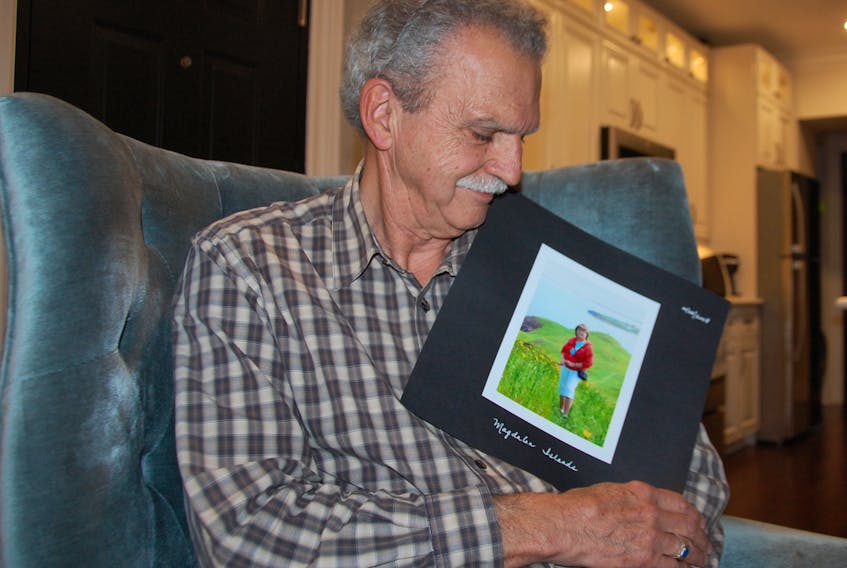CHARLOTTETOWN, P.E.I. — Roger Gallant was not familiar with pancreatic cancer when his wife, Shirley, was diagnosed with the deadly disease in late February.
He has since learned a great deal about this particular cancer that is projected to become the third leading cause of all cancer deaths and the cancer that took his life mate from him on June 27.
“It’s a silent killer,’’ says Gallant, a 71-year-old resident of Panmure Island.
“Early diagnosis is nearly impossible.’’
Pancreatic cancer was well advanced before it was detected in his late wife – a woman known to friends simply as Sam, who Gallant fondly remembers as a loving, caring, vivacious and extroverted person.
On May 6, the couple learned Sam’s cancer was inoperable, resulting in a heartbroken husband witnessing the unfamiliar sight of his perpetually positively spouse falling into a state of despair.
Sam was admitted to hospital on June 6, where she was given powerful antibiotics that just didn’t work.
“Nothing could be done,’’ says Roger.
Sam died three weeks later.
Pancreatic cancer, a disease Roger gave no thought to over a year ago, is now a very personal cause he is determined to do his part to confront.
He has become a soft-spoken force to be reckoned with.
He wants to raise public awareness about this aggressive cancer that starts in the cells of the pancreas and eventually affects the organ's ability to assist in the digestion and the breakdown of food. More often than not, other organs linked to the pancreas will become damaged as well, such as the stomach, duodenum, liver or gallbladder, leading to such symptoms as jaundice and digestion difficulties.
Roger wants people to be aware of these and other symptoms of pancreatic cancer, including upper abdominal pain, unintentional weight loss and new onset diabetes not connected to weight gain.
He wants people to know that this year alone 5,800 Canadians will be diagnosed with pancreatic cancer, and of those 5,200 will die.
He also wants to push for more pancreatic cancer research, which he feels is falling short.
“I really want to keep this issue in the open,’’ he says.
“I think something absolutely needs to be done … if I can save one life or extend one person’s life – that’s what this advocacy is all about.’’
Here are five early signs of pancreatic cancer:
- Jaundice
- Pale/smelly stool
- New onset diabetes (not connected to weight loss)
- Upper abdominal pain
- Unintentional weight loss
Stefanie Condon-Oldrieve, the founder and director of Craig’s Cause Pancreatic Cancer Society, a national charity dedicated to both increasing survival and improving the quality of life for every Canadian diagnosed with pancreatic cancer, through awareness, education, support and research, urges individuals to be their own greatest advocate.
If symptoms of pancreatic cancer present, she says, a person should push to have all possible testing done to determine whether or not he or she has the disease.
The most important tests used to detect pancreatic cancer are imaging tests such as ultrasounds, CT scans and MRI scans. These tests use a variety of methods to see inside the body.
“Don’t be afraid to ask for a second opinion,’’ adds Condon-Oldrieve.
She says people in some provinces go up to 11 months from first presenting symptoms of pancreatic cancer to a doctor to being diagnosed with the disease.
She also notes the survival rate of pancreatic cancer is lower in Atlantic Canada than the already low national average rate of eight per cent.
Still, she is seeing change for the better occurring, such as more and more researchers becoming aware of funding they can tap into for pancreatic cancer research.
“The interest in pancreatic cancer research is there now,’’ she says.
“So, things are starting to change for the positive. So there is hope on the horizon.’’
Roger will be taking part in the annual Light Up the Lake fundraiser and awareness campaign – a five kilometre walk or run this Saturday in Charlottetown organized by Craig’s Cause. The event will be held at Joe Ghiz Park at 6 p.m.
He expects to continue pounding the pavement for the cause long after Saturday's event.
“I plan to hang around awhile and do what I can,’’ he says.

Helping shed light
- Craig’s Cause Pancreatic Cancer Society is holding its annual Light Up the Lake awareness and fundraising event.
- A 5-km walk or run will start at 6 p.m. on Saturday at Joe Ghiz Park in Charlottetown. Participants will gather at Holland College cafeteria at 5 p.m. and then head to the start/finish line.
- Registration includes headlamps, snacks, glow batons, medals and a chance to win door prizes. For more information call 1-877-212-9582 or visit craigscause.ca to register.









